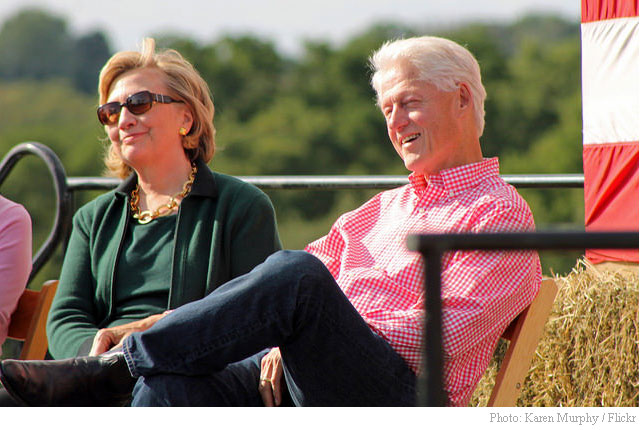
Contrary to some interpretations, the revelation that the Clinton Foundation received some 1,100 unreported foreign contributions does not prove that the Clintons are for sale. In fact, it proves the opposite.
Think about it: More than 1,000 secret contributions routed through Canada, and the Canadians couldn’t even get Hillary Clinton’s State Department to approve the Keystone XL pipeline.
The news about the Clinton Foundation’s foreign contributions, as reported in Bloomberg last week, centered on Frank Giustra, a Canadian mining financier who established a Canadian affiliate for the foundation in cooperation with Bill Clinton. That affiliate, the Clinton Giustra Enterprise Partnership or CGEP, funneled money from 1,100 undisclosed donors to the Clinton Foundation. Giustra himself is a major Clinton Foundation donor and sits on the organization’s board.
“All of the money that was raised by CGEP flowed through to the Clinton Foundation – every penny – and went to the [charitable] initiatives we identified,” Giustra said. He added that it was “frustrating” to see how a recent article in The New York Times portrayed his involvement with the Clintons.
Giustra argues that Canadian law doesn’t permit Canadian-registered charities to reveal their donors without their permission; CGEP has said it will approach its largest anonymous donors to attempt to secure their consent, but that if they say no, its hands are tied. Some lawyers and other experts have criticized the position as excessively conservative, if not entirely without basis.
The problem for the Clintons is that the Clinton Foundation promised to disclose its donors as a condition of Hillary Clinton taking her former position in President Obama’s cabinet. The agreement specifically indicated that CGEP was required to follow the same protocols as the foundation.
Maura Pally, acting CEO of the Clinton Foundation, issued a statement in response to the Times article. Pally emphasized that the foundation “took unprecedented steps to avoid potential conflicts of interest by going above and beyond what is required of any philanthropy and instituted voluntarily annual disclosure of all our donors on our website.” But because CGEP was listed as a donor collectively, the donors who contributed money through the entity remained hidden.
The Times article went into some detail in examining a deal in which Russia’s atomic energy agency, Rostaom, gradually acquired uranium mining stakes from a Canadian company that became known as Uranium One. The Clinton Foundation received various undisclosed contributions during the acquisition period, and Bill Clinton received a $500,000 speaking fee from a Russian bank promoting Uranium One stock. Giustra also had a personal stake in the Uranium One deal, as did his personal friend and fellow Clinton Foundation donor, Ian Telfer. Telfer, a Canadian, ultimately served as Uranium One’s chairman, and The Times reported that his previously undisclosed donations to the Clinton Foundation totaled $2.35 million.
The Times observed that “Whether the donations played any role in the approval of the uranium deal is unknown.” But it also emphasized the “ethical challenges” facing a philanthropic entity that relied heavily on foreign donors even as it was headed by the husband of a cabinet member with a direct hand in shaping American foreign policy.
You can’t buy the Clintons outright. But you can rent their services, if you have the scratch. This is abundantly clear, and not only from Hillary Clinton’s eye-catching speaking fees during the interregnum between her tenure as secretary of state and her formal declaration of a presidential candidacy – one which has actually been in the works since sometime around January 1993.
Since she and her husband first took up residence near the Lincoln Bedroom – you remember that nocturnal cash cow, right? – there has never been a time in which Hillary Clinton has not been either a candidate or a candidate-in-waiting. There has therefore never been a time in which those who wish to curry either her current or future official favor have not been, shall we say, incentivized to pay her a hefty six-figure honorarium for an hour or so of her unique insights concerning the workings of planet Earth, or to support the philanthropy that bears the names of every member of her nuclear family.
I have no problem with private citizens making money, even if they have previously held high public office. If some well-connected Russian wants to arrange a half-million-dollar speaking fee for former President Bill Clinton to give a lecture in hopes this will open the way to a hydrocarbon concession in Kazakhstan, I really don’t care. But it does matter – a lot – when the ex-president who accepts this engagement happens to be married to the current secretary of state, whose job is to manage and contain the Kremlin’s aggressive geopolitical machinations, as was indeed the case in 2010.
Whether Hillary Clinton admits it or not, such payments compromise her. They also compromise her country and her qualifications for the presidency. All this is true even before we get into the ethical issues of the former secretary of state keeping, and then redacting, her email records from her time at Foggy Bottom, and before we consider her family foundation’s apparently broken promise to disclose all foreign donations during her time in the Obama administration. With the Clintons, we are always left to ponder what the true meaning of “is” is.
Pity the poor Canadians. Their philanthropic and tax system gets used, or misused, to camouflage the Clintons’ cash flow, and they don’t even get enough credit to get their much-coveted pipeline built. Better read the lease agreement next time before agreeing to a rental.
Disclaimer: This page contains affiliate links. If you choose to make a purchase after clicking a link, we may receive a commission at no additional cost to you. Thank you for your support!


Leave a Reply